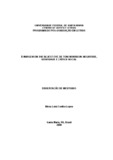| dc.creator | Lopes, Mirna Leisi Coelho | |
| dc.date.accessioned | 2009-08-27 | |
| dc.date.available | 2009-08-27 | |
| dc.date.issued | 2009-07-15 | |
| dc.identifier.citation | LOPES, Mirna Leisi Coelho. À MARGEM EM THE BLUEST EYE, DE TONI MORRISON: NEGRITUDE, IDENTIDADE E CRÍTICA SOCIAL. 2009. 114 f. Dissertação (Mestrado em Letras) - Universidade Federal de Santa Maria, Santa Maria, 2009. | por |
| dc.identifier.uri | http://repositorio.ufsm.br/handle/1/9807 | |
| dc.description.abstract | The contemporary North American fiction (African American) presents concerns regarding the identity of African-Americans. There is a need, through the literary text,
to establish a dialogue with the myths and historical models for the legacy tradition of slaves from Africa. The aim of this study is to analyze how, through the composition of the characters and through the eyes of the witness-narrator, the questions about the construction of an African-American identity are presented and discussed, and how it is possible to perceive in the novel The Eye Bluest, (1970), the resumption about the discussion about the concept of blackness. One of the interests in this
analysis is to investigate the way oppression is imposed on a black community, established in the north of the US. Both blackness and Afro-American identity are represented in Morrison´s fiction through the voice of the witness-narrator that builds a critical point of view on the white north american society and on the black community, which in many ways, reduplicates the prejudiced look launched on itself and on its members. The criticism is also established through the representation of the main character, Pecola. The research is based on analysis of the novel of the American writer Toni Morrison. The Bluest Eye is the first novel published by the author and constitutes itself as a report of the witness-narrator ´s experiences, and as the social and cultural representation of a certain community in a very precise socio-historical moment. To perform the analysis, it was necessary to establish the concepts of cultural identity, blackness, subjectivity and (Afro) American history, taking into account the fictional discourse. | eng |
| dc.format | application/pdf | por |
| dc.language | por | por |
| dc.publisher | Universidade Federal de Santa Maria | por |
| dc.rights | Acesso Aberto | por |
| dc.subject | Negritude | por |
| dc.subject | Testemunho | por |
| dc.subject | Ficção afro-americana | por |
| dc.subject | Crítica social | por |
| dc.subject | Blackness | eng |
| dc.subject | Testimony | eng |
| dc.subject | Afro-american fiction | eng |
| dc.subject | Social criticism | eng |
| dc.title | À margem em The bluest eye, de Toni Morrison: negritude, identidade e crítica social | por |
| dc.type | Dissertação | por |
| dc.description.resumo | A ficção contemporânea norte-americana (Afro-americana) apresenta preocupações referentes à identidade dos Afro-americanos. Há uma necessidade de, através do texto literário, estabelecer um diálogo com os mitos históricos e modelos legados pela tradição dos escravos vindos de África. O objetivo desse trabalho é analisar de que maneira, através da composição das personagens e através do olhar da
narradora-testemunha, são apresentados e discutidos questionamentos acerca da construção de uma identidade Afro-americana, e como se percebe, no romance The
Bluest Eye, (1970), a retomada da discussão acerca da noção de negritude . Um dos interesses nesta análise foi o de perceber como a opressão é exercida sobre uma comunidade negra estabelecida no norte dos E.U.A. As questões de negritude e identidade Afro-americanas são estabelecidas na ficção morrisoniana através da voz da narradora-testemunha que constrói um ponto de vista crítico sobre a sociedade branca norte-americana e sobre a própria comunidade negra, que em muitos sentidos, passa a reduplicar o olhar preconceituoso lançado sobre si mesma e sobre seus membros. E também, através da caracterização da personagem principal, Pecola. The Bluest Eye é o primeiro romance publicado por Toni Morrison e constitui-se como um relato de vivências de Claudia, a narradora-testemunha, e
como a representação social e cultural de uma dada comunidade, em um dado momento sócio-histórico. Para efetuar a análise, fez-se necessário estabelecer conceitos de identidade cultural, negritude, subjetividade e história (Afro) americana, levando em consideração a ficcionalidade e o discurso. | por |
| dc.contributor.advisor1 | Silva, Vera Lucia Lenz Vianna da | |
| dc.contributor.advisor1Lattes | http://lattes.cnpq.br/8773425081130876 | por |
| dc.creator.Lattes | http://lattes.cnpq.br/0331021547568669 | por |
| dc.publisher.country | BR | por |
| dc.publisher.department | Letras | por |
| dc.publisher.initials | UFSM | por |
| dc.publisher.program | Programa de Pós-Graduação em Letras | por |
| dc.subject.cnpq | CNPQ::LINGUISTICA, LETRAS E ARTES::LETRAS | por |


